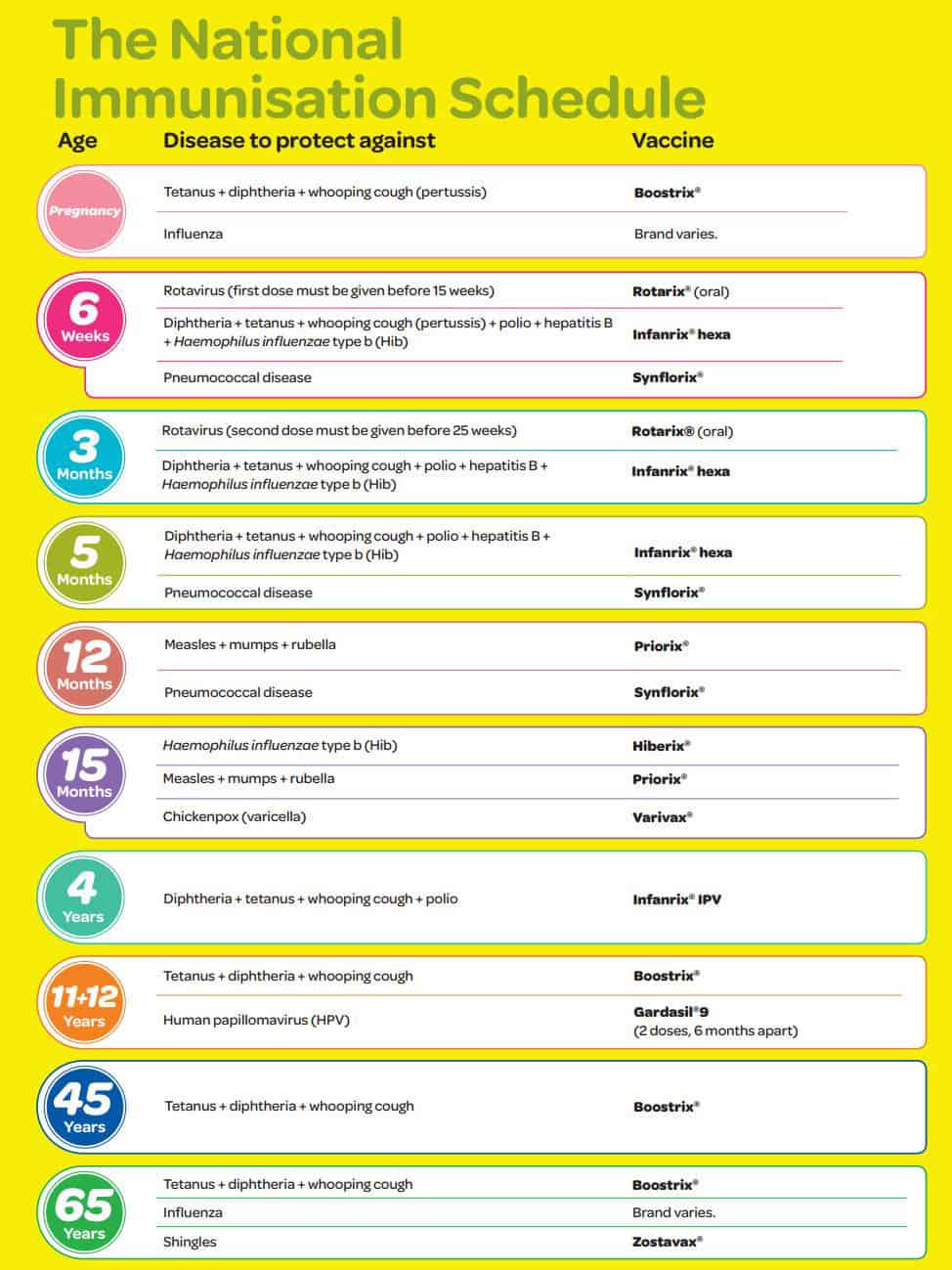A Joyful Journey Through New Zealand’s Immunisation Schedule for Your Little Kiwis
Welcome, nurturing parents, to the sunny side of health – understanding New Zealand’s immunisation schedule! The world of vaccines can sometimes feel a tad overwhelming, but have no fear because you’re about to embark on a bright and enlightening journey that will arm your precious ones for a healthy life ahead. ?
Immunisation is one of the most effective ways to protect your children from serious infectious diseases. By following New Zealand’s immunisation schedule, you are not only giving your children the best start in life but you’re also contributing to the wider community’s health. It’s a win-win for everyone!
Why Immunisation is Like a Superhero Cape for Your Kids!
Imagine if your child had a superhero cape that could shield them from harm. That’s what vaccines do in a way – they’re like tiny guardians! Vaccines bolster the immune system, equipping it with the powers to fight off specific diseases. It’s like giving your children an invisible protective shield and you, dear parents, are the ones who help them put it on.
Decoding the Timing – When to Vaccinate?
The timing of vaccinations is crucial. It’s all about ensuring that your child receives their vaccinations at the best possible moments to maximise effectiveness and provide protection when they need it most. The New Zealand immunisation schedule is carefully designed to suit the unique needs of children at various stages of their growth. Let’s make sure we stick to the adventure map (a.k.a. the schedule) and keep our kids on the path to health and joy!
Immunisation Schedule: Your Child’s Path to Happy and Healthy Days
Here’s a snippet of the New Zealand immunisation schedule to help guide you through your child’s first waves of protection:
- 6 weeks old – Buckle up for the initial joyride with vaccines for diphtheria, tetanus, whooping cough (pertussis), polio, hepatitis B, Haemophilus influenzae type b (Hib), and rotavirus.
- 3 months old – It’s time for the second round of giggles and immunity as your baby receives another set of doses for the same spirited bunch of vaccines mentioned above.
- 5 months old – The adventure continues with a third round of protective elixirs against those same infectious villains.
- 12 months old – A landmark to celebrate! At around their first birthday, your little one will be greeted with vaccines for Hib, pneumococcal, and measles, mumps, and rubella (MMR).
We’re just getting started, dear parents! The immunisation schedule continues on as your child grows, ensuring they’re warding off the nasty bugs through their early years.
Remember, each vaccination helps to create a circle of protection around your child. Keeping to the schedule is pivotal for safeguarding their future health and that of their playmates, too. It’s community immunity at its finest!
Let’s not forget that vaccinations are not just for the tiny tots. There are regular updates and boosters as your child navigates through pre-school, enters their school years, and beyond. But rest assured, we’ll cover every step, hop, skip, and jump as we move forward in this guide.
One of the sterling benefits of following New Zealand’s immunisation schedule is the confidence that you’re in tune with international health standards. The vaccines administered are rigorously tested for safety and efficacy, giving you peace of mind that you’re providing the best armor in the quest against infectious diseases.
Vaccinating your children can sometimes stir a mix of emotions—you’re eager to protect them, yet the sight of them getting a jab can sometimes tug at your heartstrings. Remember, a moment of discomfort paves the way for a lifetime of health. Plus, with the comforting cuddles that follow, you can turn the experience into a loving bonding moment that tells your child, “You’re so brave, and I’m here for you.”
The journey through life should be full of laughter, learning, and good health. By sticking to New Zealand’s immunisation schedule, you’re ensuring the soundtrack to your child’s life is full of joyful giggles and not unpleasant sniffles.
Stay tuned as we guide you further down the path of childhood immunisation, with more insights into each vaccine, tips on managing vaccination days, and the wonders of keeping your whole family’s immunity in check. Your child’s health is a precious gift, and you, amazing parents, are doing an extraordinary job in nurturing and protecting it. Together, let’s keep the melody of happy and healthy days playing on!

5 Things Parents Should Know in Preparing for NZ Immunisation Schedule
1. Gather Your Child’s Immunisation Records
Keeping a detailed immunisation record is key. Before your child’s first vaccine appointment, ensure you have any previous immunisation records on hand. This helps healthcare professionals understand your child’s history and plan the next steps. In New Zealand, the National Immunisation Register (NIR) keeps track of children’s vaccines, but a personal immunisation record can also be a helpful and immediate source of information.
2. Understanding Vaccine Ingredients and Their Safety
Knowledge is comforting! Take some time to learn about vaccine ingredients. Vaccines may contain inactivated (killed) or attenuated (weakened) versions of pathogens, as well as other components that ensure the vaccine’s safety and effectiveness. In New Zealand, Medsafe is the authority that evaluates and monitors the safety of medicines and vaccines to ensure they meet rigorous international standards.
3. Pre-Vaccination: What to Do?
Before vaccination day, dress your child in comfortable clothes with easy access to their thighs or upper arms, where they will receive the injections. If your little one is old enough, explain what will happen using reassuring and age-appropriate language. A good night’s sleep and a healthy meal can also help make the experience smoother for everyone involved.
4. On The Day: Stay Cheerful and Calm
Your own mood can influence your child’s reactions. Stay upbeat and calm to create a relaxing environment. Bring along a favorite toy or book to distract them. After the immunisation, be sure to give lots of cuddles and praise – it’s a big day for them! Some children may experience mild reactions like soreness at the injection site or a low-grade fever. These are generally normal and should subside within a few days.
5. Post-Vaccination Care
After vaccination, monitor your child for any unusual reactions, although these are very rare. It’s important to follow any after-care instructions provided by your healthcare professional. This may include applying a cool, wet cloth to reduce soreness or providing recommended doses of paracetamol for fever.
Charting the Vaccine Course: A Closer Look
Getting to know the specifics of each vaccine can increase your comfort level when discussing the immunisation schedule with your healthcare provider. Like sailors charting a course, let’s navigate through the particulars of each vaccine to understand the protection they offer:
- 6 weeks, 3 months, and 5 months old: These vaccines target a set of diseases that are particularly dangerous for infants. Adhering to the schedule is paramount since young babies are more vulnerable to complications.
- 12 months old: Vaccines like the MMR are given when the child’s immune system is well-developed enough to simulate a stronger, lasting immunity against these highly contagious diseases.
- 15 months old: Further immunisations include the booster for MMR, ensuring that the immunity from the first dose is reinforced and extended.
Throughout this odyssey of immunisation, you may have questions or concerns. It’s perfectly okay to ask! Your healthcare provider is there to support you, providing insights and information, and dispelling myths about vaccines. After all, they share your goal of safeguarding your child’s health.
Looking ahead, the immunisation schedule also includes significant milestones like the 4-year-old pre-school booster, reinforcing the body’s defenses before starting school. As adolescents, your kids will receive additional vaccines – such as the human papillomavirus (HPV) vaccine – that play a critical role in long-term health.
An ongoing commitment to the immunisation schedule ensures that your children are not only protected but also contribute to the wall of community immunity that keeps everyone safe, from their littlest friends to their grandparents. Collectively, by vaccinating, we are wrapping our communities in a warm, protective embrace – just like a cozy blanket on a cool Kiwi night.
To all the parents maneuvering through this vital part of child-rearing, remember, each small step on this immunisation journey equates to giant leaps towards a lifetime of health and happiness for your child. Keep those questions coming, embrace the process, and cherish the peace of mind that comes from knowing you are doing an extraordinary thing for your child and your community. Onward we march – let’s keep those sleeves rolled up for health!
See more great Things to Do with Kids in New Zealand here. For more information see here
Disclaimer
The articles available via our website provide general information only and we strongly urge readers to exercise caution and conduct their own thorough research and fact-checking. The information presented should not be taken as absolute truth, and, to the maximum extent permitted by law, we will not be held liable for any inaccuracies or errors in the content. It is essential for individuals to independently verify and validate the information before making any decisions or taking any actions based on the articles.




